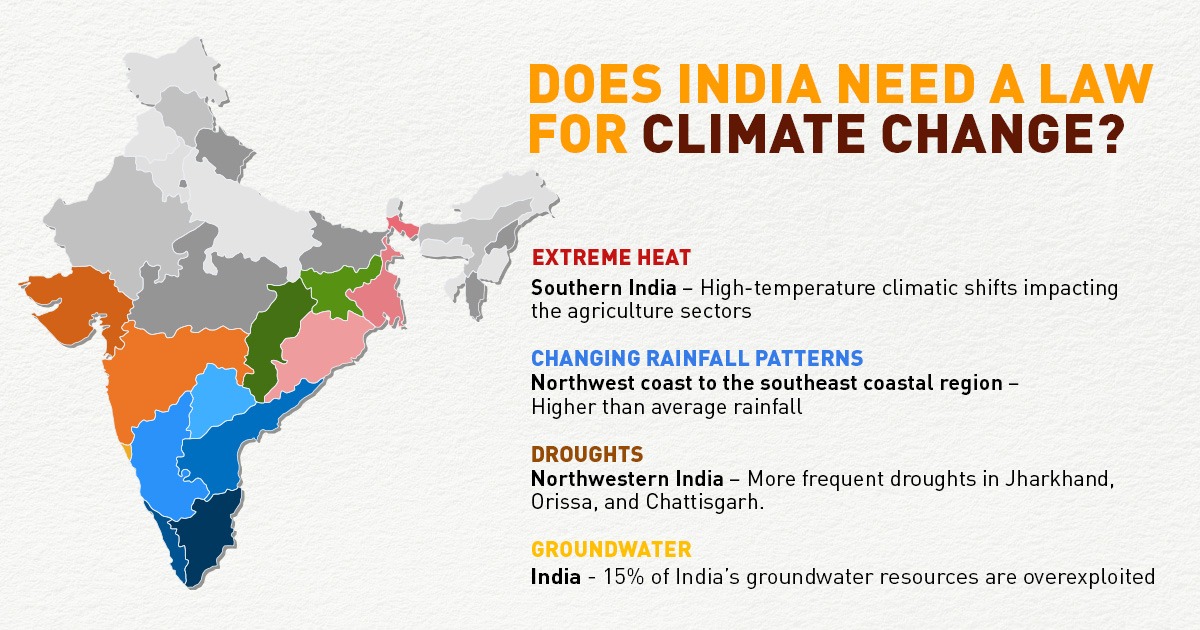According to the Center for Climate and Energy Solutions, carbon emission is responsible for 76 percent of air pollution and hence climate change in the world. It will not be wrong to say that we all are sailing in the same boat when it comes to climate change, whether it is the hegemonic power, the United States, or developing nations like India.
However, some countries understand the need for laws for climate change while others require some amendments to their climate laws. The latter category is India.
Although India has several policies and laws for climate change, some amendments are necessary for better outcomes. First, let us discuss some of the major Indian laws on climate change and the changes required according to the changing time.
1. Environmental (Protection) Act 1986 – The word “Climate” is not mentioned in the act. However, the act mainly talks about the number one reason for climate change- pollution. Not to forget, the act covers all sorts of environmental pollution, be it air, water or land.
The act gives power to the central government to reduce air pollution, improve air and water quality, make laws, and prohibit anything that may increase environmental pollution. The law was essentially made in response to the Bhopal Gas tragedy and to implement the decisions of the United Nations Conference on the Human Environment. The areas on which restrictions have been imposed were-
(i) Doon Valley in Uttarakhand
(ii) Aravalli regions in Alwar
(iii) Coastal region
Amendments required on the law – Till now Environmental Protection Act 1986 includes only one type of punishment- Imprisonment for a term of up to 5 years and a fine equal to 1 lakh. On the other hand, NGTs usually impose a heavy fine of 25 million when a company fails to comply with its rules. Environmental protection act is expected to include the penalty amount mentioned by NGT.
2. Article 48 A & 51 A – According to article 48A- The state is obliged to safeguard and protect the environment including wildlife and forest. Whereas Article 51A talks about the duty of the citizen in protecting the environment and keeping a feeling of care for all living creatures.
Are there any amendments required in the law?
As per the observations, the effect of this law was very positive. Public Interest litigations on the environment are regularly filed and proactively resolved within a few days. This also influenced environmental policies to a large extent especially when the executives failed to perform their tasks. Hence, no substantial amendment is required to the above-mentioned law. However, more strictness on executives should be imposed so that they can perform their functions well.
Article 21 A – This article points out the right of every citizen to a healthy environment. Hence indicating the importance of a clean and healthy environment to live in. However, the question that clicks our mind is- Are these articles enough? The answer is an absolute “No”.
Much has changed since the inception of these articles. We have evolved scientifically and economically. New alternatives like renewable sources, electric vehicles, and environmental menaces like GHG emissions have been discovered.
This means if the Indian government cannot amend the present laws, should make new laws with brief details on climate change, renewable resources, and more strictness in terms of punishment when a citizen or business fails to comply with the respective laws.
Not to forget, besides making new laws, the government should spread more awareness of climate change and how it is affecting our mother earth. More programs, conferences, conventions, and meetings should be organized at all levels thus paving the way for more environmental education and better compliance with the laws in the future.
How sustainable development can save our future?

Leave a Reply